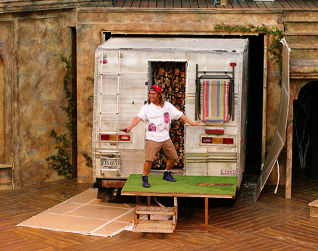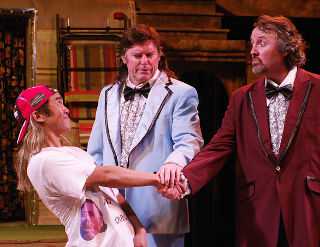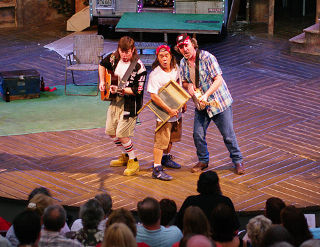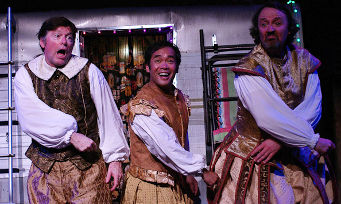Summary 
Audience-pleasing slapstick and some occasionally juicy Shakespearean cleverness, this is a spare 100-minute take on the canon, with emphasis on Romeo and Juliet in the first act, then Hamlet in the second, followed by a high-speed version then a frantic backward version of the tragedies. Fun and often funny, the production is mostly juvenile but only occasionally vulgar, suitable for a younger audience but oddly, more apropos for someone familiar with Shakespearean texts.
Design
Directed by Bill Jenkins. Costume design by Leticia Delgado. Scenic design by Michael Franklin-White. Lighting design by R. Lee Kennedy. Sound design by Jason Tucholke.
Cast
Gerson Dacanay (GaGa), David Kortemeier (Dave), Thomas Anthony Quinn (Tom).
Analysis

Bill Jenkins directs a revised revival of his own 2008 success at the Illinois Shakespeare Festival, The Complete Works of Shakespeare (Abridged), written by Adam Long, Daniel Singer, and Jess Winfield. The earlier production was energized by David Kortemeier and Thomas Anthony Quinn as southern rural idiots who crash their RV - en route to a NASCAR event - onto the set of a scholarly discussion of Shakespeare. In this slightly revised version, they are now the mulleted half-brother stars themselves, embracing artistic director Deb Alley after her opening remarks and accepting applause in their tuxedoes. Tom wears a purple tux, and Dave's is sky blue, complete with a bow tie, cummerbund, and yellow work boots. Their show is of course interrupted by an RV crashing through the set, this one driven by their greatest fan, and they use the authentic-looking RV interior as their backstage space for props and costume changes.

The new production is profoundly silly, with Dave and Tom - their theatrical agent is "Mom" - referring to their newfound Hispanic friend as "our little quesadilla" then dubbing him "GaGa" as he volunteers to help the show go on. When GaGa gamely reads a biographical history of Shakespeare from 3x5 index cards, they pop out of the RV in mid-costume change to make jokes about his marriage to a Farmer's Daughter, and later, when GaGa's supposed history - Shakespeare invaded Poland in 1939 - takes a woeful turn. The parody of Romeo and Juliet that highlights the first act is particularly adolescent, with a bullhorn used to advertise the Festival's "serious" production, a duel with a tennis racket versus a ladle, the beating of a life-like doll of Dave, a wigged Romeo holding a rose with blue fuzzy dice dangling from his belt, and GaGa as Juliet with a traffic cone on her head for a Renaissance hat. The silliness is pervasive - their second-act take on Hamlet includes the Prince's antic disposition as something akin to Sylvester the Cat doing the Bard, and the play-within-a-play mousetrap is performed with sock puppets behind a short wall in the balcony - and sometimes veers into the downright vulgar, with Dave referring to his tuxedo as "a pale blue pile of crap," or later rubbing his leg lewdly on a lady pulled from the audience to play Ophelia, along with recurring jokes: the protest "but, love" results in Dave being referred to as Butt Love for the entire first act.

After GaGa is accepted - with a big hug for Dave: "awkward!" - Tom and Dave whip off their awful tuxedoes as if tear-away basketball warm-up suits to the throbbing song, "Too Sexy." The long-haired GaGa, wearing a backward red baseball cap and a white T-shirt over cargo pants, joins the dancing black-clad stage crew as the public address system blares Pink's rowdy "Raise Your Glass" and they string lights, arrange props - "what's the dealio?" - hang a Dave and Tom fan club banner, and set up a beer cooler between a couple of battered lawn chairs. Jenkins begins with Dave playing a church-like mini-organ while Tom polls the audience for Shakespeare expertise: "may the Bard be with you." The entire production is imbued with modern music, with a Romeo and Juliet duel scored from a spaghetti western soundtrack, Friar Laurence mumbling like Don Corleone to the theme from "The Godfather," and Hamlet enhanced with bits from "The Twilight Zone" and "The Exorcist" as well as the song, "Dream Weaver." Classic rock has a definite place here, with a "Stairway to Heaven" dance intro to one play and Troilus and Cressida meeting to Nazareth's "Love Hurts," while contemporary pop, used ostensibly for a younger audience's enjoyment and identification, is also in liberal use: Dave's idiot Romeo dances with GaGa's cone-head Juliet to Katy Perry's "Teenage Dream" (a wink at the Festival's Romeo and Juliet production in repertory with this show); Lady Antebellum's "Need You Now" and Train's "Hey Soul Sister" play through intermission; and Dave begins the second act with a comically horrible dance to Perry's "Firework."
The first act focus is Romeo and Juliet, highlighted by show-stopping moments. Dave and GaGa as the titular lovers seem loath to actually kiss one another, moving closer in an extended comic hesitation - someone in the audience gasps "oh no!" as they get close - and GaGa's Juliet clambers atop the RV as a makeshift balcony while Dave's Romeo sneaks to the cooler for a swig of beer. Romeo's duel with Tybalt is conducted with pink flamingoes, the Nurse shuffles along muttering a shrill "alack alack alack," and the pledge to swear by a virgin becomes an extended chase through the audience, trying to find a virginal patron - "her?" - in the crowd. Comical asides abound, from Romeo's Deliverance-like "you've got a purty mouth" to Tybalt's "forgot my weapon, I'll be right back" and Tom's Friar commenting about Juliet's poison: "beer before liquor, never sicker."
The trio's take on Titus Andronicus is to stage the bloody revenge story as a modern television cooking show - "Tight-Ass Androgynous" - with Dave in a white wig and apron serving pie on a barbecue grill and preparing "Timon Gumbo." GaGa's Lavinia can only give a mumbled gurgle due to her tongue being cut out, a horrifyingly unfunny moment that somehow amuses, especially when she is scolded: "don't get your panties in a bunch." The rap music Othello is far better and much more clever, the boys alternating raps with Tom on banjo and Dave on guitar, leading an audience chorus sing-along and clap-along. GaGa plays washboard rhythm and the audience sings well - "rollin' in my baby's arms, my wife's cold and dead, with a pillow on her head, rollin' in my baby's arms" - although Tom apologizes at the conclusion for the tragic theme: "it's Othello, it ain't Much Ado."

The comedies are literally given short shrift, read in a high-speed summary of clichés and plot elements that condenses sixteen plays into one tangled mess of a story, and then the tragedies are addressed, with Macbeth the keynote, "in perfect Scottish accents." The accents are of course exaggerated brogues - "toil and trooble" - and the climactic fight features a steak knife against a broadsword, waged in extreme slow-motion and choreographed to the song, "Eye of the Tiger." Topical references abound, from "beam me up, Scotty" to Macduff's cry of "freedom!" from Braveheart, to the severed head of the tyrant being a Wilson volleyball a la "Castaway." The rest of the tragedies are pretty much given single lines - Julius Caesar: "et tu, bruh?" and Antony and Cleopatra: "is this an asp I see before me?" - with a constant search for "props props props." They even address Two Noble Kinsmen, with Tom mangling it into "Chernobyl Kinsmen," and the Roman tragedies are dismissed as dull and boring - "as soon as you said 'Agamemnon,' I was, like, asleep" - as GaGa does break dances and jumping jacks to amuse himself. Tom even defends his knowledge of Shakespeare with an allusion to "Blazing Saddles" - "I love my Willie, which I'd like to whip out for you now" - as he consults a paperback within his robe.
The first act concludes with the handling of the History plays as a grand game of Kings and Queens played to the theme music from "Monday Night Football," a sequence that works well - better than most, in this production - because it includes quite a bit of cleverness within the ridiculous sight gags. Using the English crown as a football, one King is poisoned going in for a score at the ten yard line, King Lear is whistled and given a penalty flag for being a fictional character, the various Henrys pile up on the crown with a cry of, "fumble!", and Henry VIII pauses at the five yard line to chop off another wife's head. The trio concludes with cheerleader cheers, despite Tom's huffing and puffing, "this was easier three years ago."
The conclusion of The Complete Works of Shakespeare (Abridged) is all Hamlet, all the time, as the trio realize it is the only play they have not covered - "I thought it was a Mel Gibson movie, before he went crazy" - but Tom becomes overwhelmed by the daunting greatness of the title role as well as the play itself. Tom attempts hiding among the audience and clings to a patron, but is discovered - "hey, let go our actor" - and exits in such dejection that the exasperated Dave - "you Shakespeare wussy" - calls for a break and an intermission. When the production resumes, Dave buys Tom more time by distributing a single 3x5 index card among the audience, purportedly with all 154 sonnets printed on it, in a very tiny font. After Dave insists that Tom participate as Hamlet - "you git 'er done" - he delivers an outstanding "what a piece of work is a man" soliloquy, his voice melancholy but impassioned, in the first truly serious moment of the entire evening. Kortemeier receives wealthy applause, and Quinn's Tom enjoys a series of fiery lines: at his angry "frailty, thy name is woman" he gestures toward a woman in the audience, then follows up with a finger point ("yeah, you"); his commingled anger and grief show in his "there are more things in heaven and earth, Horatio...so piss off" comment; and his comical aside "to sleep perchance to dream...or to just take a nap" draws amused laughter.
The ghost of Hamlet's father, laboring beneath a heavy white sheet, gives a long and impassioned speech - followed by "boo! boo! boo!" - but the most intriguing portion of the production is the pseudo-psychoanalytic approach to Hamlet. The trio pulls a random woman from the front row of the audience to represent Ophelia, and they nickname her "Scooter" before her only stage direction: give a terrified scream. After enlisting a young man to represent "ego" and run continuous laps past Scooter on the stage, they divide the audience into sections, with the first three rows representing the subconscious, waving their arms back and forth over their heads and repeating, "maybe...maybe not." The "masculine" section of the audience is instructed to shout "get thee to a nunnery!" on cue, as is the "feminine" section, which shouts "paint an inch thick!" The id section is given the demanding role of saying to the Prince himself, "cut the crap, Hamlet, my biological clock is ticking, and I want babies now." The sequence pulls together very well, the audience responding to cues with boisterous shouts, the whole scene punctuated by Scooter's blood-curdling scream followed by laughter and applause. Tom completes the scene with Hamlet's grieving arrival at the grave - "it is I, Hamlet, the Great Dane" - then ends the parody itself with his own anguished soliloquy, again spoken in earnest seriousness with a strong sense of rhythm and diction, and he earns a round of applause.
After just ninety minutes of manic silliness, the trio takes their curtain call, then gifts the audience - "faster!" - with a wildly quickened version of Hamlet, the ghost of the King reduced to a single "boo," and Tom again, this time announcing, "it is I, Omelet, the cheese Danish." And for a grand finale, the exuberant cast performs the same quickened Hamlet even faster, and backward, the show reduced to three words - "silence! slain! poisoned!" - and the ghost's comically simple "oob."